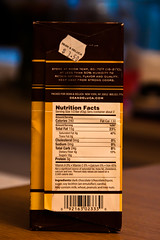Health and Nutrition Facts Of Chocolate
Health & Nutrition Facts Of Chocolate
Chocolate is one of the yummiest type foods in around the world and is highly unlikely to ever go out of fashion. There are actually hundreds of facts connected with chocolate, but recently, many people are simply not aware of the fact that chocolate has plenty of health and nutritional benefits. Chocolate has many uses and comes in many forms. It is used in candies, beverages, ice cream and baked goods. It appears in liquid, powered, and solid forms. Cocoa and chocolate are very helpful to health. Cocoa and chocolate contain a large amount of antioxidants (flavinoids). Cocoa and dark chocolate may keep high blood pressure down and reduce the blood’s ability to clot, thus the risk of stroke and heart attacks may be reduced. A small square (20 g) of dark (bittersweet) chocolate every three days is the ideal dose for cardiovascular benefits.
A single chocolate chip can provide enough energy for an adult human to walk 150 ft. It also helps in depression, high blood pressure, Tumors and Pre-menstrual syndromes. Chocolate is a helpful for people but it can be deadly for dogs because chocolate contains Theobromine can be toxic to a dog’s central nervous system and cardiac muscles.
Every year people spend more than billion dollars on chocolate. One small amount of baking chocolate or cocoa contains 10% of the daily recommended intake of iron. Milk chocolate is the most preferred type of chocolate. The Amount of caffeine in Chocolate is very little – about 5 to 10 milligrams of caffeine in one ounce of bittersweet chocolate, 5 milligrams in milk chocolate, and 10 milligrams in a six-ounce cup of cocoa. Compare this to 100-150 milligrams found in a cup of coffee.
Chocolate makers use 40% of the world’s almonds and 20% of the world’s peanuts. It has also rich magnesium and iron. Chocolate contains high-quality anti oxidants that can protect you from developing cancer and heart disease. Chocolate provides in three forms milk chocolate, white chocolate and dark chocolate.
Milk Chocolate Nutritional Facts:
Serving Size : 1oz.or28.6g
Calories : 157
Protein : 1.7g
Total Fat : 10g
Saturated Fat : 6g
Cholesterol : 5g
Fiber : 0.57g
Carbohydrates : 15.44g
Sugars : 15.15g
Sodium : 26.8mg
Potassium : 98mg
Calcium : 52mg
Vitamin E : 128mg
Riboflavin : 84mg
White Chocolate Nutritional Facts
Serving Size : 1oz.or28.6g
Calories : 162
Protein : 2g
Total Fat : 10.58g
Saturated Fat : 6.57g
Cholesterol : 8.58g
Fiber : 0
Carbohydrate : 14.87g
Sugars : 14.87g
Sodium : 31mg
Potassium : 97mg
Calcium : 78mg
Vitamin E : 147mg
Riboflavin : 118mg
Dark Chocolate Nutritional Facts
Serving Size : 1oz.or 28.6g
Calories : 150
Protein : 1.7g
Total Fat : 10g
Saturated Fat : 6g
Cholesterol : 0.28g
Fiber : 3.14g
Carbohydrate : 13.15g
Sugars : 12.58g
Sodium : 29.5mg
Potassium : 153mg
Calcium : 9.1mg
Vitamin E : 102.49mg
Riboflavin : 32.3mg

No comments:
Post a Comment